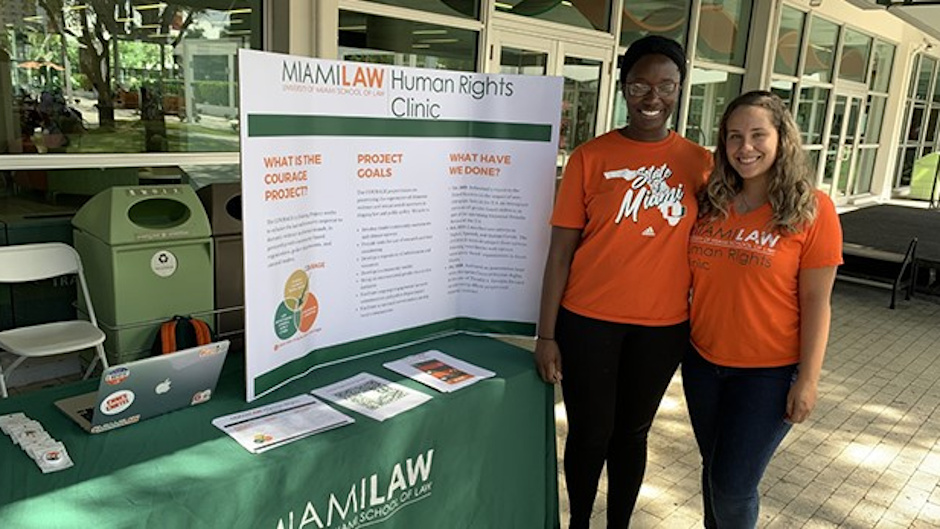Miami Law’s Human Rights Clinic, with a coalition of organizations, filed an amicus brief on September 25 in the Southern District of Florida, supporting a lawsuit by the City of South Miami alongside civil and immigrants’ rights groups that seeks the repeal of a draconian state law that harms immigrant survivors of domestic violence, sexual assault, and human trafficking.
The law, SB 168, requires every Florida county and municipality to expend “maximum local resources” and make “best efforts” to enforce federal immigration laws by cooperating with federal Immigration and Customs Enforcement to arrest and detain individuals suspected of being illegal immigrants. SB 168 puts survivors and their families in danger and poses a threat to public safety, and violates constitutional and international law.
The brief – filed on behalf of the Miami Law clinic and the Rural Women’s Health Project, Florida Council Against Sexual Violence, M.U.J.E.R., Tahirih Justice Center, Los Angeles Center for Law and Justice, Oxfam America, Center for Gender & Refugee Studies, Human Rights Watch, and Florida Legal Services, all of whom have deep expertise working on gender-based violence and immigrants’ rights—makes three key arguments:
- SB 168 will place immigrant survivors of domestic violence, sexual assault, and human trafficking in vulnerable positions that will place them at a greater risk of abuse, which in turn poses a threat to public safety.
- SB 168 will exacerbate survivors’ trauma, exposing them to inhumane conditions in detention centers and leading to family separation.
- SB 168 violates the international human rights law, to which the United States is bound.
“SB 168 will have devastating effects on survivors of domestic violence, sexual assault, and human trafficking in Florida,” said Amanda Suarez, a Human Rights Clinic fellow. “U.S. and international law impose a clear duty on Florida and our nation to support access to justice and services for all survivors. It has been extremely rewarding to work on this brief over the last year because this is such an important issue that affects so many people across the State of Florida.”
The United Nations is slated to consider the human rights violations caused by anti-immigrant laws like SB 168 at the next Universal Periodic Review of the United States, in November 2020. During this process, the United Nations will review the human rights record of the United States and assess the country’s compliance with international human rights law. In October 2019, the Miami Law Human Rights Clinic submitted a report to the UN Human Rights Council on the impact of SB 168 and other anti-immigrant laws in the U.S. on immigrant survivors of gender-based violence.
"This amicus brief is one of many examples of the multidimensional lawyering that Miami Law Human Rights Clinic students are spearheading at the local, national, and global levels,” said Caroline Bettinger-López, director of the clinic. “To highlight the human rights violations spurred by anti-immigrant laws like SB 168, my students and I wrote an op-ed for the Miami Herald, submitted a report to the United Nations Human Rights Council, co-authored an article in the Harvard Latinx Law Review, and filed this federal court brief in support of immigrant survivors in Florida. By touching different audiences, we hope we can make a difference, and bring human rights home to Florida.”
Indeed, the Human Rights Clinic’s multidimensional lawyering supports local human and civil rights advocacy, including by other Miami Law clinics. The original lawsuit and preliminary injunction were filed by the Southern Poverty Law Center, Community Justice Project and the University of Miami School of Law Immigration Clinic. Plaintiffs include the Florida Immigrant Coalition, Farmworker Association of Florida, WeCount!, Americans for Immigrant Justice, Hope Community Center, QLatinx, Westminster Presbyterian United Church, the Guatemalan-Maya Center, Family Action Network Movement, the city of South Miami and South Miami Mayor Philip K. Stoddard. The lawsuit and preliminary injunction were filed by the Southern Poverty Law Center, Community Justice Project and the University of Miami School of Law Immigration Clinic.
Read more about Miami Law's Human Rights Clinic
More on Human Rights at Miami Law

